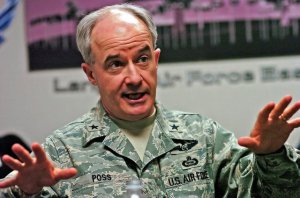The Federal Aviation Administration held its first online UAS privacy forum last Wednesday afternoon, and a recurring theme emerged — many think the FAA shouldn’t be involved in UAS privacy at all.
 “We shouldn’t take the focus of the world’s finest aviation safety organization off of safety. We should leave privacy, which is a very important concern, up to [other] agencies,” said retired Air Force Major General James O. Poss, a specialist in unmanned aircraft systems who now works as a researcher at Mississippi State University.
“We shouldn’t take the focus of the world’s finest aviation safety organization off of safety. We should leave privacy, which is a very important concern, up to [other] agencies,” said retired Air Force Major General James O. Poss, a specialist in unmanned aircraft systems who now works as a researcher at Mississippi State University.
Mr. Poss was one of about 40 Americans who offered comments during the FAA’s two-hour virtual town-hall meeting, part of an ongoing federal effort to assure citizens that their Fourth Amendment and privacy rights won’t be discarded as the domestic UAS boom unfolds.
The specific purpose of the online session, which was open to anybody who registered in advance, was to discuss privacy protocols at the agency’s six drone test sites, where the crafts will be put through a battery of experiments before they’re integrated into U.S. airspace in September 2015.
Because it’s the lead agency in operating those sites, the FAA can and will implement privacy procedures at each location. But it has no authority to write or enforce broader, nationwide privacy policies.
Such rules must be drafted by other arms of the federal government, leading some to argue that the FAA is wasting its time by even talking about the issue.
“I would prefer to have the FAA continue its focus on aviation safety and not focus in areas that are not the FAA’s expertise,” said Timothy Adelman, an Annapolis attorney and flight instructor with experience in the unmanned aircraft systems arena.
“The problem is not the aircraft in the air but the use of data obtained. Regulating the use of data is not the FAA’s responsibility,” he said.
Other participants argued that privacy guidelines should be written by Congress. More than a half-dozen bills to govern UAS have been introduced by federal lawmakers, and while the details of those measures differ, each deals in some way with where drones can fly, what types of data they can collect, how much information the public should have access to, and other related issues.
At least 30 states are considering their own UAS privacy bills, as are a number of local governments.
While privacy was the dominant theme, other concerns cropped up during the FAA’s forum.
An Arizona woman fears that, if the agency selects an area near her home to host one of the test sites, peace and quiet will become things of the past.
“Noise would be a major intrusion and should be minimized or eliminated entirely,” she said.
A Florida woman said the FAA should only operate test sites in remote areas to reduce the chances that a crash would result in injuries.
A Missouri man said that the UAS debate has been backwards, and that the focus should instead be on how quickly the federal government recognizes Americans’ freedom to own and operate UAS as methods of self-defence under the Second Amendment.
The FAA will continue to accept public comments on its test site programme. The six locations are expected to be announced later this year.
Source: The Washington Times
